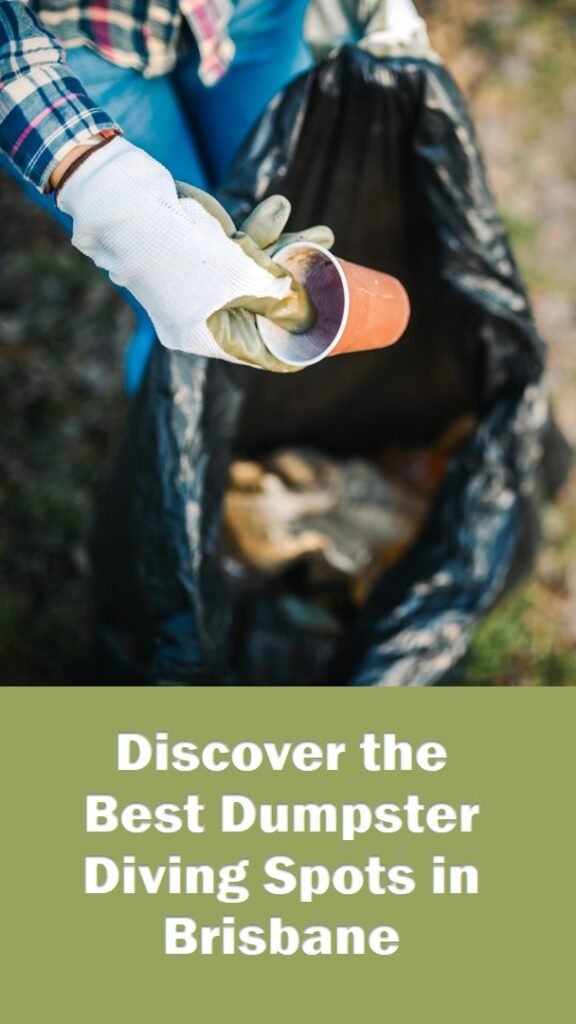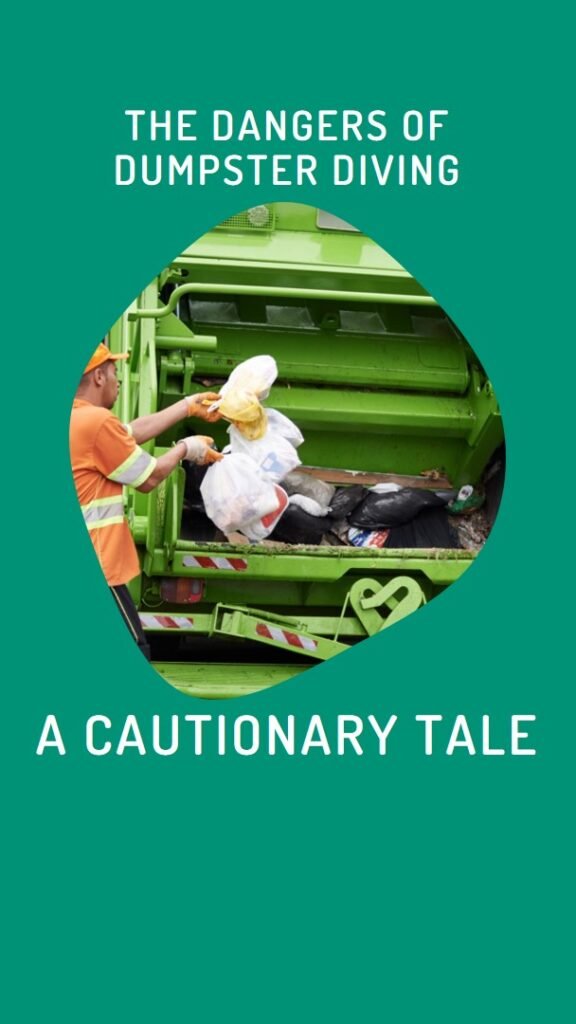Dumpster diving is the practice of searching through commercial or residential waste to find items that have been discarded but are still usable. In Brisbane, dumpster diving is a way for some individuals to reduce waste and acquire items for free. Many people participating in dumpster diving see it as a form of recycling and a way to live sustainably by utilizing resources that would otherwise go to waste.
Is Dumpster Diving Illegal in Brisbane?
Yes, in Brisbane, dumpster diving is considered legal as long as individuals do not trespass on private property to access the dumpsters. However, it is important to note that laws and regulations regarding waste management may vary by location, so it is advisable to check with local authorities before engaging in dumpster diving activities. Overall, dumpster diving can be a way to find items, reduce waste, and contribute to a more sustainable lifestyle in Brisbane.
Is Dumpster Diving Illegal at Nighttime in Brisbane?
No, dumpster diving is legal during nighttime in Brisbane as long as individuals adhere to the laws and regulations related to waste management. However, it is essential to exercise caution and respect private property boundaries while engaging in this activity.
Environmental Impact
Dumpster diving, a practice where individuals search through dumpsters or trash bins for discarded but still useful items, can have a significant environmental impact by reducing waste, promoting resource utilization, and raising awareness about excessive consumerism.
- Reduction of Waste: Dumpster diving helps in reducing the amount of waste that ends up in landfills by salvaging usable items.
- Resource Utilization: By repurposing discarded items, dumpster diving promotes resource efficiency.
- Promotes Recycling: Participants in dumpster diving contribute to recycling efforts by finding new uses for discarded materials.
- Raise Awareness: This activity can also raise awareness about excessive consumerism and the value of reusing items.
Overall, dumpster diving in Brisbane offers individuals an opportunity to reduce waste, acquire items for free, and contribute to a more sustainable environment by giving discarded items a second life.

Best Locations for Dumpster Diving in Brisbane
Best Locations for Dumpster Diving in Brisbane: Brisbane offers a variety of locations that are ideal for dumpster diving, a practice where individuals search through dumpsters or trash bins for discarded but still useful items. From urban areas to retail and food outlets, here are some of the best spots for dumpster diving in Brisbane.
Supermarkets and Grocery Stores: Supermarkets and grocery stores often dispose of food items that are slightly damaged or close to their expiry dates, making them ideal locations for finding edible goods. Packaging materials like boxes, bubble wrap, and containers can also be salvaged from these locations for reuse. It is essential to check local regulations regarding food safety when dumpster diving for consumable items.
Electronics and Furniture Outlets: Retail stores that sell electronics and furniture may discard items that are slightly damaged, returned by customers, or considered out of season. Dumpster diving in these locations can yield items like electronics, appliances, and furniture that are still functional and in good condition. Ensure proper testing of electronic items for safety and functionality before use.
Apartment Complexes and Residential Areas: Apartment complexes and residential areas can be fruitful locations for finding discarded furniture, appliances, and household items. People often leave behind items when moving out or upgrading, and these can be salvaged for personal use or resale.
Construction and Renovation Sites: Construction and renovation sites often have dumpsters filled with materials like wood, metal, and other building supplies. Salvaging these materials can be useful for personal projects or resale.
College Campuses and Student Housing: College campuses and student housing areas are prime spots for finding discarded furniture, electronics, and other items at the end of the school year or semester. Students often leave behind items they no longer need when moving out, and these can be salvaged for personal use or resale.
Industrial Areas and Manufacturing Plants: Industrial areas and manufacturing plants may have dumpsters filled with materials like metal, wood, and plastic. These materials can be salvaged for personal projects or resale. Be sure to exercise caution in these areas, as they may have safety hazards.
Recycling Centers and Waste Management Facilities: Recycling centers and waste management facilities may have dumpsters filled with recyclable materials like cardboard, paper, plastic, and metal. These materials can be salvaged for reuse or recycling. Be sure to check local regulations and obtain permission before diving in these locations.
Farmers Markets and Food Distribution Centers: Farmers markets and food distribution centers may have dumpsters filled with unsold produce or other food items. These items can be salvaged for personal use or donation. Be sure to check local regulations regarding food safety when dumpster diving for consumable items.
Restaurants and Cafes: Restaurants and cafes often dispose of food items that are slightly damaged or close to their expiry dates, making them ideal locations for finding edible goods. Packaging materials like boxes, bubble wrap, and containers can also be salvaged from these locations for reuse. Be sure to check local regulations regarding food safety when dumpster diving for consumable items.
Retail Stores and Shopping Centers: Retail stores and shopping centers may discard items that are slightly damaged, returned by customers, or considered out of season. Dumpster diving in these locations can yield items like clothing, accessories, and household goods that are still in good condition. Be sure to check local regulations regarding trespassing and obtain permission before diving in these locations.
Tips for Successful Dumpster Diving:
- Plan Your Timing: Plan dumpster diving expeditions during off-peak hours or after closing time to increase the chances of finding discarded but usable items. Being aware of the store’s disposal schedule can help target the best times to explore dumpsters without interference.
- Safety Precautions and Hygiene:
- Wear gloves and sturdy shoes to protect against sharp objects or hazardous materials while diving.
- Carry hand sanitizer or wipes for quick cleanup and practice proper hygiene when handling retrieved items.
By following these tips, individuals can engage in successful dumpster diving excursions while staying safe and mindful of hygiene practices.
What You Can Find While Dumpster Diving in Brisbane
What You Can Find While Dumpster Diving in Brisbane: Brisbane offers a variety of treasures for dumpster divers, including food, clothing, household items, electronics, and more. By exploring dumpsters in urban areas, retail outlets, and grocery stores, divers can uncover valuable items that have been discarded but are still in good condition.
Food and Groceries
- Packaged Goods: Dumpster diving in Brisbane can yield various food items, including packaged goods, fruits, and vegetables that are still edible but might have reached their sell-by date.
- Imperfect Produce: Local grocery stores often discard imperfect but safe-to-eat produce, canned goods with minor dents, and bakery items at the end of the day, providing divers with a source of free food.
Clothing and Household Items
- Gently Used Clothing: Apart from food, dumpster divers in Brisbane may come across gently used clothing, shoes, and other household items that are still in good condition.
- Surplus Inventory: Retail outlets, furniture stores, and donation centers frequently dispose of surplus inventory, slightly damaged items, or outdated merchandise, offering divers the opportunity to find useful items for personal use or repurposing.
Electronics and Gadgets
- Smartphones and Tablets: Dumpster diving in Brisbane can yield discarded smartphones, tablets, and other electronic gadgets that may still be functional.
- Laptops and Computers: Industrial areas and university campuses are prime locations for finding discarded laptops, computers, and accessories.
- Chargers and Accessories: Dumpster divers may also come across chargers, cables, and other electronic accessories that can be useful.
- Entertainment Devices: DVD players, gaming consoles, and other entertainment devices are occasionally discarded and can be found in good condition.
By exploring dumpsters in Brisbane, individuals can uncover a variety of items that are still functional or in decent shape, contributing to waste reduction and offering cost-effective alternatives for everyday needs.

Challenges and Risks of Dumpster Diving
Health and Safety Concerns:
- Contamination Risks: Dumpster diving poses potential health risks as items found may be contaminated, spoiled, or past their prime, leading to foodborne illnesses or other health issues if consumed.
- Sharp Objects and Hazards: Users need to be cautious of sharp objects, chemicals, and hazardous materials that could be present in dumpsters, which may cause injuries or adverse reactions upon contact.
Dealing with Authorities:
- Legal Gray Area: Dumpster diving operates within a legally gray area, and individuals may face trespassing charges or fines if caught by authorities while scavenging through bins on private property.
- Local Regulations: It is essential to be aware of local regulations and restrictions regarding scavenging to avoid legal repercussions and conflicts with property owners or law enforcement officers.
Community and Sustainability Aspects of Dumpster Diving in Brisbane
In Brisbane, dumpster diving fosters a unique sharing economy where individuals reclaim discarded items that still hold value. This practice promotes community cooperation and reduces reliance on traditional consumerism by redistributing usable goods. Participants often share their findings with others, contributing to a culture of generosity and waste reduction. This communal aspect of dumpster diving strengthens social bonds and encourages resourcefulness among community members.
Reducing Waste and Promoting Recycling
Dumpster diving in Brisbane plays a vital role in reducing waste sent to landfills and promoting recycling efforts. By salvaging items from dumpsters, divers help extend the lifecycle of products and lessen the environmental impact of excessive consumption. – This sustainable approach not only benefits the environment but also raises awareness about the importance of responsible waste management practices. Through dumpster diving, individuals actively participate in a grassroots movement towards a more environmentally conscious society.
Personal Experiences and Stories from Brisbane Dumpster Divers
Many dumpster divers in Brisbane have shared success stories about finding quality items like clothing, electronics, and even furniture that they were able to refurbish or repurpose. These successes highlight the value of exploring discarded goods for personal use or to pass on to others in need. Some divers have mentioned how dumpster diving not only helped them save money but also sparked their creativity in finding innovative ways to utilize salvaged items. These stories inspire others to consider the possibilities of reducing waste through dumpster diving.
How much money can you make from dumpster diving in Brisbane?
While the financial gains from dumpster diving can vary, individuals in Brisbane have reported significant savings by finding items such as food, household goods, and clothing that would have otherwise been purchased at retail prices. Some divers have even turned their dumpster diving finds into profitable ventures by selling or upcycling them. Although the monetary returns may not be consistent, the value of reducing consumption, promoting sustainability, and fostering a sense of community through dumpster diving in Brisbane is often considered priceless by those who partake in this eco-friendly practice. Avergelly people are making the 400$ to 1100$ per month approximately.
Conclusion
Brisbane dumpster divers have found success stories in salvaging quality items like clothing, electronics, and furniture, showcasing the benefits of repurposing discarded goods. Diving not only saves money but ignites creativity in utilizing salvaged items. This practice inspires waste reduction. – Financial gains from dumpster diving in Brisbane vary, with divers saving significantly on food, household items, and clothing. Some have even profited by selling or upcycling finds. While monetary returns fluctuate, the non-monetary benefits of sustainability and community-building are treasured.
Find Dumpster diving legality in your city
Choose your city to find all the details about the legality of dumpster diving in Australia:

Greetings, eco-conscious explorers! I am Arjun Bandari, a seasoned Dumpster Diving enthusiast with over a decade of expertise in uncovering hidden treasures amidst the discarded. My journey into this unconventional lifestyle began in New York, fueled by a passion for sustainability and a desire to challenge the norms of our throwaway culture.
With a bachelor’s in Enviromental Health and Safety, I seamlessly blend academic insights with practical experiences to navigate the world of Dumpster Diving. Over the years, I’ve become a recognized figure in the sustainable living community, sharing my discoveries and insights through workshops, community outreach, and various online platforms.
My commitment to promoting eco-friendly practices has garnered attention from local and regional media, earning me featured spots in publications that highlight the environmental impact of Dumpster Diving. As an advocate for responsible waste management, I have been honored with awards recognizing my contributions to the field.
In addition to my hands-on experiences, I’ve extended my reach through various published works, shedding light on the untapped potential within discarded items. Whether it’s repurposing furniture, salvaging electronics, or sharing practical tips for fellow Dumpster Diving enthusiasts, I am dedicated to inspiring a conscious and sustainable way of living.
Join me on this exciting journey as we redefine the narrative around waste, discover hidden gems, and collectively contribute to a greener, more sustainable future. Together, let’s dive into the world of Dumpster Diving and uncover the beauty beneath the surface of our disposable society.

